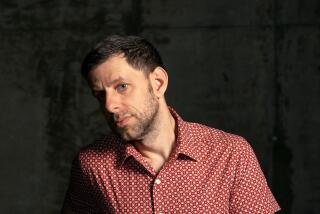Bolshoi Reshaping Image for American Tour : Opera: The Soviet company, beset by rapidly changing conditions at home, is looking for a hit on its first visit to the United States in 16 years.
- Share via
NEW YORK — With political and cultural turmoil surging through the Soviet Union like ground waves from an earthquake, the Bolshoi Opera urgently needs to make a hit on its first visit to the United States in 16 years.
Resumption of contact with an American audience--beginning tonight at the Metropolitan Opera--is “very important to us,” said Valery Levental, the Bolshoi’s chief designer and one of the three men considered the architects of a far-ranging reshaping of the world-famous company. Loss of the tradition and prestige associated with the Bolshoi name “would be the worst thing for us,” Levental said recently during a telephone interview from Moscow.
To put their new feet forward, Levental, stage director Boris Pokrovsky and music director Aleksander Lazarev, the troika that has run the company since 1988, have taken a daring step: rather than offer operatic fare that would be a sure draw, the company has come with only one familiar work--a brand new production of Tchaikovsky’s “Eugene Onegin”--and two operatic rarities: Rimsky-Korsakov’s opera-ballet “Mlada,” in its first American stage production, and Tchaikovsky’s “The Maid of Orleans,” in its New York stage premiere.
Things were quite different when the Bolshoi was last here in 1975. The Cold War was gripping the two nations tightly.
Today, the political situation in the Soviet Union is changing so quickly and the economic outlook is so bleak that while the Bolshoi is no longer working in a centralized system where bureaucrats control artistic decisions, it is also no longer sure of guaranteed government support. The theater is being forced to find its own way at a time that is, Levental said, “the worst period in our history, in our lives, for the culture. We are changing, going so fast that we need the support from the government more and more.”
Today’s Bolshoi Theater, which includes both the opera and the ballet, is a refreshed company, Levental said, but not a radically new one. “I try to keep the tradition, but in the same time I like to see the Bolshoi as the best modern contemporary company. I try to combine the two tendencies: the rich traditions and the fresh ideas. It is very difficult to create something new, but it is so easy to kill the tradition.”
Although Pokrovsky, who has been at the Bolshoi since 1943, is a veteran, both Lazarev, who was appointed music director in 1987, and Levental, named in 1988, are newcomers to the company.
Lazarev has conducted the Berlin Philharmonic and the Orchestre National de France, and is chief conductor of the Duisburger Sinfoniker in Duisburg, Germany. Levental has worked with several respected European directors, including Walter Felsenstein of the Komische Oper Berlin, Harry Kupfer and John Conklin.
More to Read
The biggest entertainment stories
Get our big stories about Hollywood, film, television, music, arts, culture and more right in your inbox as soon as they publish.
You may occasionally receive promotional content from the Los Angeles Times.









